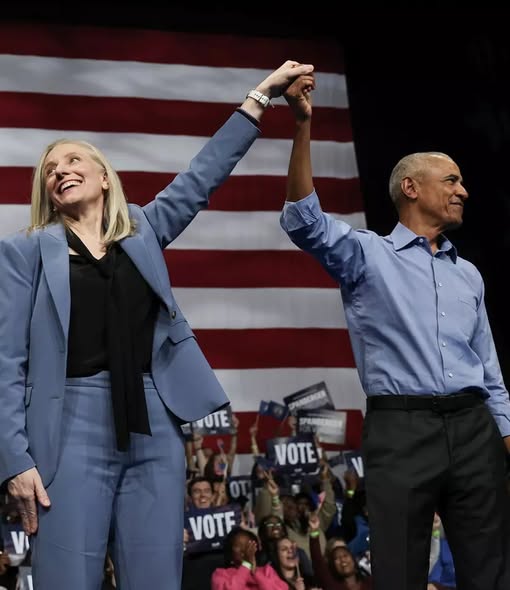Barack Obama’s rally speech in Norfolk was more than just a political address; it was a masterful blend of reflection, humor, critique, and a call to arms. As the nation continues to navigate increasingly polarizing times, Obama’s remarks served as a timely reminder of the fragile state of democracy and the urgent need for citizens to take action. His words were not just a critique of current leadership but also a plea for a more principled, transparent, and accountable government.
In front of a lively crowd, Obama warned that democracy was fragile and in danger of being overtaken by forces that prioritize power and fear over truth and justice. His call to action was not merely rhetorical; it was a direct challenge to every American to recognize the power they hold and use it to shape the future.

The Fragility of Democracy: A Warning for the Ages
Obama’s speech started with a personal recollection from his earlier days in office, where he warned about the dangers of complacency and the fragility of democratic institutions. “I did warn y’all, but here we are,” Obama began, acknowledging that, while his concerns had been voiced before, the reality was even worse than he had feared.
He reminded the audience that the core of American democracy could easily be undermined if fear, division, and the pursuit of power over principle took center stage. “If you give in to fear, to scapegoating, to putting power over principle,” Obama said, “you are going to end up with leaders who treat the government like their own personal playground.” These words echoed the stark realities of what America is witnessing today. What was once a democratic experiment is now being tested by forces that are actively working to undermine its integrity.
Democracy, Obama emphasized, isn’t guaranteed. It’s fragile and requires vigilance, dedication, and most importantly, participation. He pointed out that the world was seeing a shift toward leaders who treat government institutions as instruments of personal gain, rather than as stewards of the people’s welfare. In doing so, Obama highlighted the importance of maintaining the checks and balances that define American democracy, acknowledging the increasing challenges the nation faces as the political system seems more vulnerable to exploitation than ever.
“The stakes are now clear,” Obama stated, urging the crowd to reflect on how far the country had come and how much was at risk. He warned that when the balance of power is upended and leadership becomes a game of winning at all costs, the true nature of democracy is compromised. This wasn’t just a political statement—it was a call to safeguard what many take for granted.

The Struggle Against Autocracy: A Critique of Current Leadership
The former president’s criticism of the current administration was pointed and unrelenting. Obama pulled no punches when addressing the conduct of the sitting president, particularly in his handling of governmental institutions like the Department of Justice. “We got a president who thinks it’s okay to use the Justice Department to go after his political opponents,” Obama remarked, underscoring a growing concern about the politicization of law enforcement.
His next remark, delivered with biting sarcasm, illustrated how far removed the current leadership is from the challenges facing ordinary Americans. Obama recalled, “If you had told me ten years ago I’d be watching weird videos of a U.S. president with a crown on his head, flying a fighter jet, dumping poop on protesting citizens, I would have thought you were pitching a bad movie.” His words were not just a critique; they were an indictment of the bizarre and reckless direction the country had taken under the current leadership.
Obama’s description of these “weird” and troubling moments became a powerful metaphor for the erosion of democratic norms. It wasn’t just that the president’s actions were strange or far-fetched—they were symptomatic of a deeper dysfunction, a disregard for the sanctity of democratic institutions and the public trust. His address was an acknowledgment of how much had changed since his presidency, and how the political environment had become increasingly unrecognizable.
Leadership Misplaced: The True Priorities of Power
Obama didn’t just critique the behavior of the current president; he also targeted the misplaced priorities of the administration. In an administration that should have been focused on the struggles of everyday Americans—dealing with economic hardship, healthcare issues, and rising inequality—the focus was instead directed at frivolous and self-indulgent pursuits.
“While families are worried about making rent and paying for groceries, he’s been focused on really critical issues like paving over the rose garden so folks don’t get mud on their shoes, gold plating the Oval Office, and building a ballroom,” Obama said. This remark cut through the layers of opulence and excess that characterized the current administration’s focus. Rather than addressing the urgent needs of the people, the leadership seemed obsessed with aesthetics and luxury—an administration more concerned with appearances than actual solutions.
Obama’s criticism was clear: leadership must be rooted in serving the people, not in self-serving gestures or trivial pursuits. He reminded the crowd that leadership is about recognizing the needs of those who are struggling, not about indulging in ego-driven projects that benefit only the privileged few.

The Power of Voting: A Rallying Cry for Action
Perhaps the most significant part of Obama’s speech was his emphasis on the power of voting. While the address was a critique of current leadership, it was also a call to action. Obama made it clear that the future of America—its democracy, its principles, and its values—was in the hands of the voters.
“The future is in our hands,” Obama proclaimed. “The stakes are now clear. We all have more power than we think, and now is the time to use it.” His words were a powerful reminder that, in a democracy, citizens have the ultimate say in how the country is governed. He implored the audience to take ownership of the future, emphasizing that the path forward was in their hands.
Obama underscored the importance of showing up for candidates who stood for justice, equality, and transparency—leaders like Abigail Spanberger, who was running for office. His call to action was specific and urgent: “Now is the time to act. All of us deciding what kind of Virginia, what kind of country, we want to wake up to tomorrow.” It was a direct appeal to the audience to recognize the significance of their vote, knowing that their participation could tilt the balance in the upcoming election.
The message was clear: elections matter. They matter now more than ever, and the power to shape the nation’s future rests in the collective hands of its people. Obama’s reminder that each individual’s vote can make a difference was not just an encouragement—it was a challenge to ensure that the right leaders are put in power.
The Future: Shaped by Democracy and Principle
In closing, Obama offered a hopeful note about the future, despite the current political turbulence. He acknowledged the difficulties ahead but reiterated that the situation was far from hopeless. His final words were a call to action, emphasizing that democracy could still be salvaged through collective effort, civic engagement, and a return to leadership based on principle. “We all have more power than we think,” Obama concluded, urging the crowd to believe in their ability to bring about change.

Democracy at a Crossroads—What Happens Next?
Obama’s speech in Norfolk was more than a mere political critique; it was a powerful reminder of the stakes at hand. Democracy is not something that can be taken for granted—it must be fought for, protected, and nurtured. The speech served as both a warning and an invitation: a warning that the current political environment poses real threats to the values and institutions that define the United States, and an invitation to act—to step up, vote, and take responsibility for the future.
As Obama’s words echoed through the rally, one thing became clear: the future of America is not just determined by those in power, but by the people who choose to show up, speak up, and vote. The call for action was loud and unmistakable: the time for complacency has passed. The future is in our hands.


